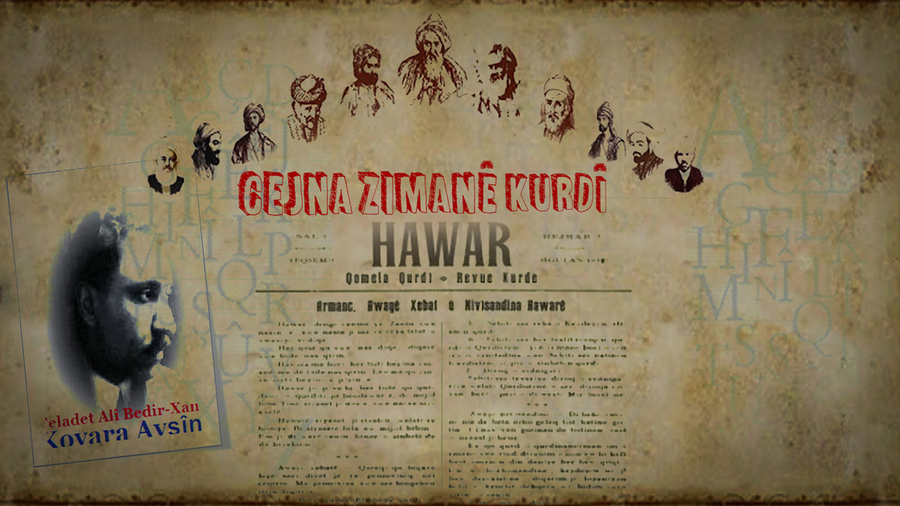Language does not consist only of words and sounds. Language is the root of a nation's existence. Every nation is known by its language. Language is a bridge between history and the present. Nations that protect their language also protect their history, culture, and art. One of the ways that keep a language alive is to be spoken and written by children. When a child does not raise in their mother tongue, it becomes more endangered day by day and year by year and disappears.
According to UNESCO, there are 7000 languages spoken in the world, of which 6000 will be threatened with extinction by the end of the 21st century. The destruction of a language means the destruction of a nation and history. “The destruction of multilingualism affects both biology and culture and many other things,” according to the United Nations.
The Kurdish language has stayed in the face of oppression. Kurdish is an ancient language and has become a symbol of resistance and struggle for the Kurdish nation. In order to preserve the Kurdish language and reach the new generations, intellectuals, scholars, and patriots of this nation have worked day and night and have brought the Kurdish language flag to the present.
One of our intellectuals, Jaladat Ali Badirkhan, has done very important work for the Kurdish language. In the history of the Kurdish language, May 5 is special and remarkable. In 1932, Mir Jaladat Ali Badirkhan and his friends published Hawar Magazine on May 5. This magazine was first published in Latin and Arabic alphabet. The Kurdish alphabet, which consists of 31 Latin letters, was used for the first time in Kurdish publications. Hawar magazine was published in both Arabic and Latin alphabet until 23 issues, then issue 24 was published only in the Latin alphabet. Hawar magazine opened the door to the modernization of Kurdish literature and language.
Mir Jaladat Ali Badirkhan wrote in the first issue of Hawar magazine:
"Hawar is the voice of knowledge. Knowledge is self-knowledge, self-knowledge opens the way to happiness. Anyone who knows themselves can introduce themselves. Our scream, first of all, introduces our language being. Therefore, language is the first condition of being."
In that situation, intellectuals and those who cared about the Kurdish language did a great job to protect the Kurdish language from bans and pressures. What is our task now is to develop our language. By speaking, reading, and writing, let us preserve our language and also pass on the flag of our language to our new generations.
During those years, despite the lack of opportunities, the Kurds showed a strong attitude towards their leaders and volunteers, and Jaladet Ali Badirkhan and his companions worked as revolutionaries of the Kurdish language. When we look at the present era, of course, very important work is being done for the Kurdish language, but so far to develop the language, why did not another Jaladat appear in the 21st century to focus on this issue? Why don't our children grow up in their mother tongue? When we research the Kurdish language, we see that speaking another language in families is increasing daily and language institutions should develop new plans to change this situation because the assimilation of the Kurdish language is still going on.
In 1908, in the third issue of the Kurdish Cooperation and Development magazine, Ismali Haqi Babanzadeh spoke about the importance of education in the mother tongue and said the following about language:
“In short, the foundation of a nation's security is education and the key to education is language. The door to modernity is opened with this key. I ask our nation to think about this important point.”
The key to the liberation of the Kurdish nation is, above all, the Kurdish language. We must speak and write in Kurdish in every field. Every family must become a Kurdish school. When children grow up multilingual, this is critical for their development. According to research, these children are more advanced in reading than other children. The goal of any Kurdish parent should first be to educate their children in their mother tongue, and then in any country they live in, they will easily learn another language, Turkish, English, or German. Children are smarter than adults when it comes to language learning.
According to other UNESCO data, 40 percent of the world's population is not educated in their mother tongue. Millions of people have been denied this right due to pressure and state policies. When we look at monolingual and multilingual data, there can be hundreds of languages spoken in a country, for instance, Papua New Guinea 850, Nigeria 427, Cameroon 270, Zaire 210, Solomon Islands 66, Australia 250, India 380, and Indonesia 670.
Multilingualism is an asset for countries, but in countries like Turkey, the Kurdish language was banned for years, and thousands of people were imprisoned just for speaking Kurdish.
Therefore, monolingualism is against the development of language, culture, arts, and sciences and the language policy of monolingual countries should be changed and education in the mother tongue should be given the opportunity.
May 5th, this historic day, the Kurdish Language Day, congratulations to all Kurds. On this occasion, I remind you of the Kurdish language intellectual and revolutionary Mir Jaladat Ali Badirkhan and his friends, in the hope that we will strengthen our activities in the field of the Kurdish language.









